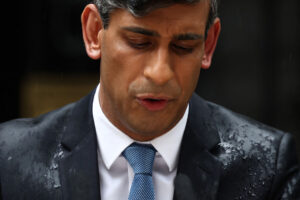For so long Labour had been preparing. “Everything has to be brilliant,” was the motto. There could be no mistakes, no risks, no complacency. The Tories could not be underestimated. And then the Prime Minister walked out of No. 10 and was shambolic. “Frankly, we’re all in disbelief at how badly they handled it,” one senior Labour figure messaged me the day after Rishi Sunak’s surprise announcement.
Wading through similar messages from Labour shadow ministers, aides and the like, I couldn’t help thinking of the scene in John Le Carré’s Smiley’s People as the disbelieving Foreign Office mandarin, Saul Enderby, questions whether George Smiley has finally discovered the great Soviet spy chief Karla’s one lethal vulnerability. “It’s not all a wicked Bolshie plot, George, to lure us to our ultimate destruction,” Enderby asks. “You’re sure of that?”
This seems to be the instinct which still lies deep in the Labour soul as it looks at the Tories with incredulity. Can they really be this bad? Surely it must all be some kind of wicked plot? “I’m afraid we’re no longer worth the candle, Saul,” replies Smiley, wearily, trying to reassure his political master. Something similar is true here. For Sunak and the Conservative Party, it seems the burden of power is no longer worth the effort to maintain it. Brexit, lockdown, Partygate and Liz Truss have combined to drain the party’s spirit. The challenges facing the country have simply proved too great. Exhausted and bewildered, they now stumble towards the end knowing they’ve lost, but unsure quite what to make of it.
For the Labour Party’s electoral strategists, the great danger in all this is a sudden loss of discipline. Keir Starmer and Morgan McSweeney do not want to become the great rope-a-dopes of modern political history, surging forward, arms swinging, looking for a knockout that never comes. And so, the strategy is to stick to the plan they have been working on for months. “Do not give the Tories the election they want,” Starmer’s campaign coordinator Pat McFadden likes to say. This, in other words, means do not make spending promises you don’t know how to pay for which will allow the Conservative Party to run “tax bombshell” headlines. But more than that — don’t allow the Conservative Party any attack line against you. Play it safe. Stand for “change”, but ensure it is not unfunded or unsettling.
The danger in such a defensive strategy is that it leaves voters feeling as though there is nothing to choose from. Introducing Keir Starmer at Labour’s first-day rally in Gillingham — Conservative majority, 15,000 — the deputy leader Angela Rayner revealed the party’s own concerns about this charge gaining traction over the next six weeks: “Politicians aren’t all the same,” she declared. “There is a choice at this election.” That is not the kind of thing you say if you don’t think it is what people are already thinking.
Labour is right to be concerned about this. In 2017, Jeremy Corbyn seemed to tap into a pent up desire for something different and almost swept Theresa May from power. In 2019, it was Boris Johnson who became the candidate best placed to take on the broken establishment, even if he was already prime minister. Rishi Sunak today cannot do the same; he is simply too much of an establishment creature. But what if some other figure manages to do so at the margins of this story? Richard Tice, say, or George Galloway. There are always sinkholes out there.
In one sense, this is not the campaign Starmer and McSweeney expected to be running when they secured the Labour party leadership back in 2020. Back then, they were facing a populist street fighter in Johnson who, in McSweeney’s analysis, was following the successful populist-right playbook, which “talked Left but acted Right” on the economy.
To deal with this, McSweeney believed the old Labour strategies — whether Blair’s “radical centrism” or Corbyn’s Left-wing populism — were doomed to fail. In one sense McSweeney’s answer was simply to do the opposite and talk Right but act Left. Traditional Tory aspirations would be adopted — home ownership, lower taxes and the like — but underneath there would be a much greater focus on boosting the incomes of the average worker and the real economy than was ever the case under New Labour. This, in effect, remains the Starmer-McSweeney strategy for government, should they get there.
Yet, the fact is the Conservative Party abandoned its “talk Left, act Right” Tory populism two years ago, when they removed Boris Johnson. Since then they have swung from madness to technocracy. Starmer’s sensible demeanour can no longer be contrasted against the wildness of Johnson’s or the recklessness of Truss, but must do so against the emptiness of Sunak. There is a charisma hole at the heart of this campaign and the danger for Labour is that something will fill it.
Writing a book about the 2017 general election, I remember being struck by the conclusion reached by one veteran campaign insider. “She’s not as good a candidate,” he said of Theresa May, as she struggled to cope with the demands of a national campaign. “She has never run for anything before other than her own constituency. No one could’ve been ready at such short notice, but especially not if you’ve never run before.” This is true for both Sunak and Starmer today. We will swiftly find out who can deal with the pressure.
The difficulty for Starmer will be to rebut the accusation that he really isn’t offering much of a change — for in the basic sense it is true. The Labour Party, after all, has accepted the Conservative Party’s spending plans and so for the first few years, at least, the “change” the party is offering can only be marginal: one of personality, competence, discipline, character. These things matter of course, but they are not structural. The house will continue crumbling, and Labour can only continue to plaster over the cracks up until it finds a way of earning more money.
But what if real change is impossible? Perhaps the Tories are stumbling, dazed and disorientated towards their annihilation, not because they are inherently incompetent and useless, though that may also be the case, but because the challenges we face are now simply too big for the tired old ideas of our political class.
It is hard for political parties to make this point, naturally. It’s not a comfortable message for any voter to hear. In Le Carré’s novel, Smiley notes how Saul Enderby “did not care to be reminded of the limitations of British grandeur”. But nor do many of us, beyond the usual superficial grumbles. No-one wants to hear, for example, that for deep structural reasons beyond our control we cannot ever be a rich country again.
Look at the challenge that a future Starmer government faces. Taxes, already at their highest level in decades, will have to rise because nobody believes the spending plans offered by either party are deliverable. But this isn’t the worst of it. Both parties are pretending that we can decarbonise our entire economy and re-industrialise it at the same time. In reality, of course, if we are to use the energy transition to re-industrialise our economy, it will require cheap polluting energy in the short term, protectionist tariffs against competition, and more government spending. And we could do all of this and still get blown out of the water by China.
We have been here before. In 1964, Harold Wilson came to power promising to sweep away the tired and out of date Conservative Party which had spent 13 years in power. Twelve years later, having won two elections, lost a third and won a fourth, he left power a broken man, tearful and spent. As he prepared to leave, he was asked about his plans. His answer was grimly revealing. He would retire to “think about the problems facing the country”.
Starmer and McSweeney believe that part of Labour’s problem since its last victory, in 2005, is that its leaders stopped “narrating the changes” that were affecting voters. The party stopped trying to explain the great trends in the world and how the government was reacting to protect people’s standard of living.
If this is the test of leadership, the most successful prime minister since 1945 is certainly Margaret Thatcher. She had a diagnosis of Britain’s ills, proferred a course of treatment, claimed to have the iron discipline to see it through, and owned the results she liked. Whether she actually transformed the economy and arrested the country’s decline, as her supporters believe, is far less clear. Another way of telling the Thatcher story is that she left office with Britain in recession, inflation again running too high, monetarism abandoned and the currency locked into the Exchange Rate Mechanism.
Something similar could be said of Tony Blair. Even his critics would admit that he “narrated the change” that was happening in the world, which lay beyond Britain’s control. Blair’s story was that globalisation was happening — and a good thing. The future was open and liberal and European. Some industries would die, but the free movement of goods, people, capital and ideas would leave Britain better off and the winners of this great global revolution would vote Labour. In the end, Blair departed a few months before the great financial crisis blew up the economic foundations of the political settlement he had constructed.
The likelihood is that whatever narrative Starmer alights on to explain the great changes happening today, they will at some point be shown to be inadequate. But no prime minister escapes this fate. Right now, the important thing for him is to win. And given the state of the Tory party, he probably doesn’t even have to explain what change he represents in order to do that come July 4.
“I want his body, George, hear me?” Enderby tells Smiley in the end. “Hand me a live, talking Karla and I’ll accept him and make my excuses later.” For now this is Labour’s instinct too. Kill the Tories and think about events later. But Enderby had a final warning for Smiley: “Don’t you ever go thinking they’ll go away.”
Disclaimer
Some of the posts we share are controversial and we do not necessarily agree with them in the whole extend. Sometimes we agree with the content or part of it but we do not agree with the narration or language. Nevertheless we find them somehow interesting, valuable and/or informative or we share them, because we strongly believe in freedom of speech, free press and journalism. We strongly encourage you to have a critical approach to all the content, do your own research and analysis to build your own opinion.
We would be glad to have your feedback.
Source: UnHerd Read the original article here: https://unherd.com/



